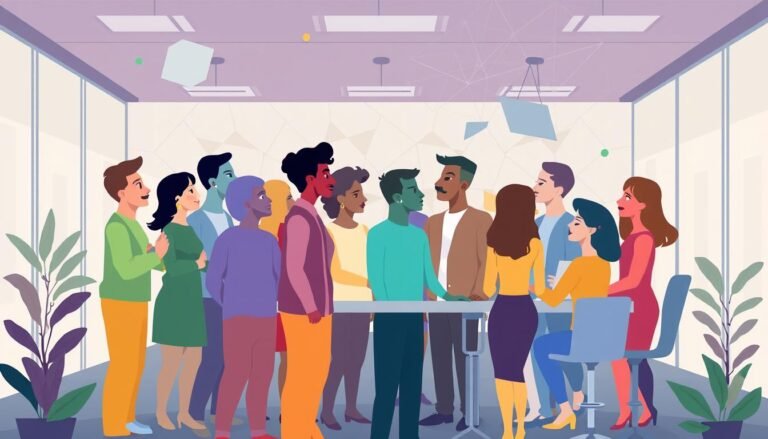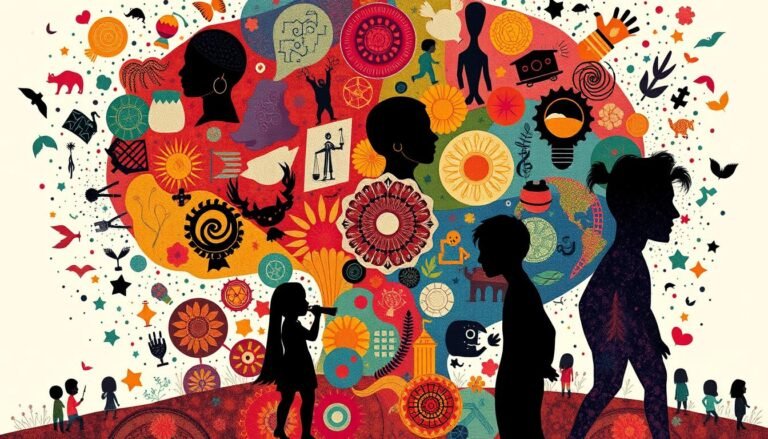Organizational Psychology Principles for Enhancing Employee Motivation in Irish Workplaces
Imagine a chilly Tuesday morning in Dublin. You’ve just started your day with a hot coffee. The tasks ahead are clear. What keeps you going as an Irish worker?
Dublin Business School took a deep look. They found key motivators are fair pay, feeling appreciated, balance, and good team connections. These insights connect with real Irish work life.
A study with 81 people showed something interesting. In Ireland, Millennials and Baby Boomers are often more motivated than Generation X. And guess what? Younger workers are usually the most driven.
Despite what some think, no big difference was seen between men and women. This shows motivation doesn’t care about gender.
These findings in Ireland match studies from around the world. For instance, research in Jakarta also linked motivation to better job performance. This shows motivation is a powerful force in workplaces everywhere.
As we learn more about organizational psychology, we see how Ireland’s workplaces can get better. By using smart motivation strategies, everyone can work happily and more effectively.
Key Takeaways
- Competitive remuneration and recognition are crucial motivational factors for Irish workers.
- Millennials and Baby Boomers show higher motivation levels compared to Generation X.
- No significant relationship between gender and motivation was found in the Irish workforce.
- A positive correlation exists between younger age and higher motivation.
- Effective motivation strategies can lead to improved employee performance globally.
Introduction to Organizational Psychology in Irish Workplaces
Organizational psychology helps us understand workers and boost business results in Dublin. This field looks at what motivates us, makes us happy at work, how we work together, our health, leaders, and company culture. It aims to find ways to make employees better at their jobs and enjoy where they work.
Students in this field work hard, spending 20 hours in lectures, 2 hours in seminars, and 103 hours studying alone. They learn how to make jobs that people want to do, see the value in working as a team, and how to use psychological ideas in human resources.
Grading often includes online tests and essays. This mix checks how well students understand and use what they’ve learned. Reading books and checking online materials helps a lot.
In Dublin, using organizational psychology means making real changes. By knowing what motivates workers, jobs can be made more rewarding. Teamwork boosts innovation and gets more done. The right leadership can make a workplace a happy and effective place. Good leaders help organizations perform their best.
The culture of a workplace really matters. It affects how everyone behaves and thinks. A strong culture means people work well together and are happy. But a bad culture can make people unhappy. Being open to change makes an organization stronger and more creative.
Checking how ready a company is for change is key. Culture, how leaders lead, and how we talk to each other all matter. To change successfully, you have to involve everyone, learn from the past, and ask people what they think.
| Focal Area | Details | Importance |
|---|---|---|
| Motivation Process | Drive, direction, persistence | High |
| Team Benefits | Collaboration, creativity, productivity | High |
| Leadership Styles | Controlling, Inspiring, Analytical | Medium |
| Organizational Culture | Behavior, attitudes, productivity | High |
| Capacity for Change | Employee engagement, past initiatives | Medium |
In the end, using organizational psychology well can boost business and keep employees happy. These principles lead to better motivation and success at work in Dublin.
The Impact of Generational Diversity on Employee Motivation
It’s key to know what gets each generation at work to boost engagement in Ireland. Different age groups have various views and want different things at work. Companies need to adapt to meet everyone’s needs.
Motivational Factors for Different Generations
Abdullatif found that each generation in Ireland responds to unique motivating factors. These include pay, free time, chances to advance, office vibes, and roles. These elements affect how satisfied people are with their jobs and how hard they work.
This study argues that a person’s life experiences and the economy shape what they look for in a job. Although work preferences and reasons for changing jobs vary, many values are shared. For example, 87% of Gen Zers would switch jobs for better values alignment. Also, 60% put company values first when thinking about leaving their job.
Differences in Work Performance Motivation
The research shows different work motivations among Baby Boomers, Gen X, and Millennials. Abdullatif points out that Millennials and Baby Boomers are more easily motivated than Gen X. To keep everyone on board, companies should use methods that suit each group’s needs.
Additionally, how well Irish employees connect with their jobs is greatly influenced by these distinctions. For example, 59% of Europeans would not take a job if their personal values don’t match the company’s. This highlights the need to make sure employees and companies share key values.
Generational Attitudes towards Work
Abdullatif’s work also shows that every generation looks at work and motivation differently. Younger workers, like Gen Z and Millennials, care a lot about the values of their workplace and room for growth. Baby Boomers and Gen X focus more on pay and the office environment. Knowing these differences helps companies meet everyone’s work needs, which can boost morale and productivity.
Workplace Incentives: Boosting Employee Morale and Productivity
Good incentive programs are key to making employees motivated and productive. They encourage employees by showing their hard work is noticed and appreciated. This makes them feel part of something important.
Effective Incentive Programs
To raise morale and loyalty, there are many paths companies can take. Giving cash bonuses can ease financial stress for employees, making them happier and more focused.
Allowing staff to work flexibly also boosts their spirits. A work environment that supports physical and cultural well-being is crucial. It’s also important to help remote workers feel connected and valued.
Case Studies from Irish Companies
Case studies from Ireland show us how well-organized incentives improve employee happiness. For example, benefits like cycling to work or extra holidays really make a difference.
A study confirms that happy employees are less likely to leave. It also found that cultural knowledge boosts all aspects of work, something Irish companies can learn from.
- Employee motivation can encourage innovative ideas and new ways of thinking within a company, enhancing productivity.
- Morale-boosting incentives, such as recognizing employees for outstanding work achievements, can increase motivation and job satisfaction.
- A productive workforce is often observed in workplaces with motivated employees, resulting in improved revenue outcomes.
- Irish company incentives, like income protection and extra holidays, can influence employee morale positively.
- Examples from employee morale case studies illustrate how diverse incentive strategies contribute to higher productivity and reduced absenteeism.
By offering the right incentives, companies can show they value their staff. This fosters a workplace where everyone feels they belong and are motivated from within.
Corporate Culture Transformation: Creating a Motivating Environment
The culture in a company is key for a motivating workplace. By changing the culture, you can lift employee spirits. This leads to higher work output, keeps employees longer, and boosts the company’s success.
The Role of Organizational Culture in Employee Motivation
Organizational culture is vital for a company’s triumph. When employees are really motivated, a company can be 21% more profitable. Also, top engaged teams have less days off and stay at their jobs more, showing a strong link between motivation and success.
| Benefit | Engaged and Motivated Teams | Non-Engaged Teams |
|---|---|---|
| Profitability | 23% greater | Baseline |
| Absenteeism Reduction | 41% | Baseline |
| Attrition Reduction | 59% | Baseline |
Steps to Transform Corporate Culture
To improve your work culture, take these steps:
- Promote Work-Life Balance: People who balance work and life well can be happier and more productive. Helping them achieve this makes them more willing to work hard.
- Recognition and Appreciation: If workers get recognized well, they’re 20 times more likely to feel connected to their work. A simple ‘thank you’ can make nearly 70% of them do more than expected.
- Democratize Recognition: Letting peers honor each other, like Atlassian and Ally Financial do, builds a team culture of gratitude.
- Foster Team Connection: Many feel isolated working from home; team events can fix this and boost motivation.
- Clarify Sense of Purpose: Work gives 70% of people their life’s meaning. When a company’s goals match theirs, employees are more motivated.
By using these ideas, companies can completely change their culture. This boosts morale and business success. An encouraging workplace not only inspires staff but also looks after their happiness for the long term.
Leadership Development and Its Effect on Employee Engagement
Leadership programs are key for creating powerful leaders. These leaders can boost how involved employees are in their work. Training leaders this way helps make work better for everyone. It cuts down on mistakes, raises happiness, and makes people healthier overall.
Leadership Styles and Their Impact
Leadership styles can really change how into their work people are. Good leaders bring better attitudes, freedom, and trust, which makes people work harder. The results? Companies do well, workers are happier, and customers like the service more. Good leaders also build trust and help everyone work as a team, making everyone feel like they belong and matter.
Most workers want better engagement and a nicer place to work, over just more pay. Styles that make work feel good and help people grow make the best teams.
Training Leaders to Inspire Their Teams
Leadership training boosts leaders’ skills to encourage and support their teams. It works on things like reading emotions, toughness, and handling stress. This makes workers feel better about their jobs, stay longer, and think up new ideas.
Also, when a company trains its leaders, it shows it cares about its people. This caring boosts excitement and teamwork. Everyone feels more connected to the company’s goals.
Great leadership isn’t just nice, it’s also great for making people work better. Here are some points that show why good leadership matters:
| Metric | Impact |
|---|---|
| Employee Disengagement Rate | Nearly six in ten employees are psychologically disengaged at work. |
| Economic Cost of Low Engagement | Low employee engagement costs the global economy $8.8 trillion (9% of the global GDP). |
| Enhanced Employee Productivity | Engaged employees are more productive and likely to stay with the company long-term. |
| Leadership Impact on Engagement | Positive leadership was significantly associated with improved employee engagement and reductions in deviant behavior. |
In the end, leadership programs that teach how to lead well are important. They make work a place where everyone does their best. By showing leaders how to motivate and support, companies turn into places where people want to help the business grow.
Enhancing Employee Motivation in Irish Workplaces
Improving employee motivation enhancement in Ireland means looking at both what’s inside each worker and what’s outside. Top companies show us great ways to make their teams thrive. Making work a place where people want to do their best can make everyone happier and work better.
Building a strong company culture helps boost motivation. Google is great at making a happy place to work, so the best people stay. Amazon spends a lot on helping its workers grow, showing that learning and improving matter a lot.
Making work more meaningful is also key. TOMS Shoes lets its employees know they’re helping out through its One for One® model. Regularly praising workers, like how Starbucks’ “Bean Stock” does, keeps everyone in high spirits and more likely to stay.
- Flexible Work Arrangements: Like what IBM does with its flexible policies, can make people happier with their work and life.
- Career Development: Deloitte shows that clear career paths and mentorship help people see their future in the company, keeping them motivated.
- Autonomy: Offering employees freedom and trust, as Netflix does, can make them love their jobs more and do better work.
The following facts back these ideas up:
| Company | Strategy | Impact |
|---|---|---|
| Salesforce | Employee Wellness – “Ohana” Culture | Boosted health and happiness, plus more work done well |
| Marriott | Strong Performance Strategies | Kept workers engaged even in tough times |
| Deloitte | 2 Million Hours on Performance Management | Big focus on making sure workers do their best |
By using these workplace motivation strategies well, you can get a team that’s really into their jobs. The secret is to listen to what your people need and offer them good reasons to stay and grow.
Workplace Wellness Initiatives: Promoting Health and Motivation
Adding wellness programs at work is key to boosting employee health, motivation, and happiness. Regular movement at work can cut down the chances of getting serious health issues like heart attacks and diabetes. Since many jobs require sitting most of the day, it’s important to push for being active.
A healthy work team is more productive, creative, and closer. Companies can boost their wellness plans by tapping into resources like Get Ireland Active and Healthy Ireland. They can also get help from groups like the Irish Heart Foundation and Get Ireland Walking.
Focusing on staff health also makes a company more appealing. They can use high-tech wellness solutions, such as fitness trackers, to keep track of health signs like sleep and heart rate. This gives employees the tools to be more active in looking after their health. Plus, having a place to set and follow wellness goals helps a lot.
The CIPD Well-being Pyramid teaches us that the culture of a workplace really matters. Strong leadership and good people management can make a big difference. It shows how combining team and individual efforts can create a well-rounded health plan. Ireland stands out in tackling mental health with counseling and a positive work environment. Tackling health from all angles sees better team spirit, more work done, fewer sick days, and lower medical bills.
Detecting health problems early is very important. That’s why health checks and wellness activities are now a must at work. Guidelines like the Healthy Workplace Framework and ISO45003 stress the importance of mind health.
Dealing with stress and mental health issues head-on is crucial. Offering counseling and stress management workshops makes a work team healthier and happier. By using these strategies, companies can have a staff that’s more involved and excited about work.
Talent Retention Practices for High-Performance Workplaces
Keeping top talent is crucial for a high-performance workplace. In Europe, one-third of surveyed employees plan to quit in the next few months. This shows the need for solid strategies to keep them happy. Google, a top workplace, shows how to do this right.
Keeping Top Talent Engaged and Motivated
It’s key to stop talented people from leaving. Those feeling disconnected are almost four times as likely to quit over bad culture. So, it’s important to have a welcoming culture. Things like job security and chances to grow are more important than just money. For example, the SAS Institute offers perks like child care and unlimited sick days. This has really helped them keep their team happy.
Strategies to Reduce Employee Turnover
Companies need to do a lot to keep their best people. They should talk openly and involve staff in picking new members. Keeping an eye on who’s doing great and giving them feedback helps. But, even with all this, keeping talent can be tough. So, it’s vital to always look for ways to do better.
In short, it’s crucial to use smart strategies to keep the best people. Offering more than just money, having a great culture, and keeping track of everyone’s efforts helps. This way, a company can have a team that’s ready to give their best every day.
FAQ
What are the principles of organizational psychology for enhancing employee motivation in Irish workplaces?
Irish workplaces use many strategies from organizational psychology to boost employee motivation. They offer competitive pay. They also focus on recognition and good relationships among team members. Work-life balance and job security are key. So is giving employees some control over their work.
How does organizational psychology apply in Irish workplaces to enhance business performance?
Organizational psychology improves different aspects like employee motivation and teamwork. It also looks at happiness at work and the way people lead. By working on these areas, businesses have a more effective and interested team.
What motivational factors vary across different generational groups in Ireland?
Generations like Millennials, Generation X, and Baby Boomers are motivated by different things. They all like good pay, recognition, and strong bonds at work. But, the level of importance of these things is different for each group. Boomers and Millennials are the most motivated by these factors.
What are the differences in work performance motivation among generational cohorts?
Research by Abdullatif suggests work motivation changes by generation. Millennials and Boomers are usually more motivated than Generation X. This might be because they see work in different ways.
How do generational attitudes towards work affect employee motivation?
Each generation responds to work motivation in their unique way. By knowing what motivates each group, we can create better strategies to keep them engaged. This can lead to more productivity at work.
What are some effective incentive programs to boost employee morale and productivity?
Good incentive programs include rewards for good work and chances for job growth. They might also include flexible hours. These programs make employees feel valued and part of the team.
Can you provide examples of incentive programs from Irish companies?
In Ireland, companies use things like rewards for reaching goals and programs for better health. These have made employees happier and more productive.
How does organizational culture play a role in employee motivation?
The culture in a workplace can really affect how motivated people are. A supportive and positive culture can make employees feel good about their jobs. This often leads to better work and a happier place to work.
What steps are involved in transforming corporate culture to improve motivation?
Changing a company’s culture means sharing new values and better communicating. It also includes training leaders to support their teams. Recognizing hard work is vital, too. It’s about creating an inspiring and engaging work place.
How do different leadership styles impact employee engagement?
Leadership styles like transformational, transactional, and servant leadership can change how involved employees are. Using these styles well can make a big difference in how motivated and dedicated people are to their work.
What training is necessary for leaders to effectively inspire their teams?
Leaders should learn about understanding emotions, good communication, team building, and solving problems. This kind of training helps leaders better guide and motivate their teams.
What are some strategies to enhance employee motivation in Irish workplaces?
Creating good incentive programs, having strong leaders, and changing the company culture can help. Adding wellness initiatives also boosts how happy and productive employees are.
How do workplace wellness initiatives promote health and motivation?
Wellness programs support both physical and mental health. When employees are healthy and feel supported, they’re more likely to be motivated and do well at work.
What practices can help retain top talent in high-performance workplaces?
Keeping good people involves offering chances to grow and recognizing their work. A friendly work place and giving employees a say in decisions are key to keeping them.
What strategies can be implemented to reduce employee turnover?
To keep employees, it’s important to make the workplace better and offer chances to move up. Recognizing hard work and good pay are also essential. These steps help employees feel loyal and stay longer.
Source Links
- Enhancing employee performance through motivation: the mediating roles of green work environments and engagement in Jakarta’s logistics sector
- PSY20130 – Module Details
- PSY20130 Introduction to Work and Organisational Psychology UCD Assignment Sample Ireland
- Gen Z Workforce: Values as the Catalyst for Job Change
- Comparative empirical analysis of motivational differences of various generational cohorts in the Irish workplace.
- Employee Motivation | Peninsula Ireland
- The Impact of Incentives on Job Performance, Business Cycle, and Population Health in Emerging Economies
- Why Monetary Incentives Matter in the Workplace – HRHQ Ireland’s No1 Choice for HR News & Resources
- Employee motivation and why it’s important for organizations
- employee motivation
- Creating a Culture of Recognition
- Can Leadership Development Boost Employee Engagement?
- Positive leadership and employee engagement: The roles of state positive affect and individualism-collectivism
- Employee Engagement – Empowerment and Motivation
- Beyond Salary: Exploring Key Employee Motivations
- Enhancing employee performance through motivation: the mediating roles of green work environments and engagement in Jakarta’s logistics sector
- What are the top strategies for managing employee performance in Ireland?
- Physical Activity – Healthy Workplace Ireland
- Corporate Wellness Trends in Ireland: What’s next?
- Who to Watch in Workplace Wellbeing in Ireland in 2022 — Work Well Community
- Mastering Talent Retention: A Complete Guide
- 14 Effective Employee Retention Strategies
- Investing in Talent: How Employee Retention Programs Drive Company Growth – CoachHub








